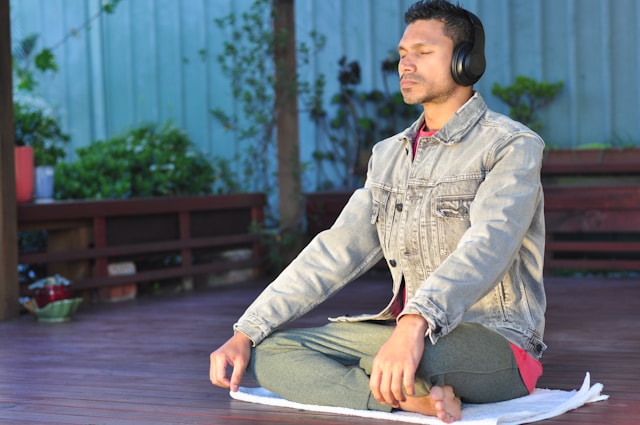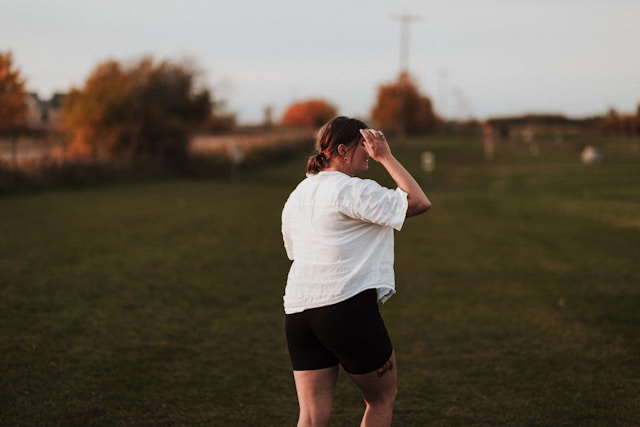Sarah had tried everything. She went for long runs every morning, swore by her daily meditation sessions, and practiced breathing exercises to the letter. After doing so, she felt better, but only for a little while. When the day got stressful due to work pressure, family issues, or the usual grind, her anxiety would flare back up, sometimes worse than before. Thoughts of all that could go wrong would take over, and she’d spiral into her head, trying to figure out solutions to problems that hadn’t yet occurred.
The worst part? No matter how much she exercised or meditated, it didn’t seem to stop the anxious thoughts. She was frustrated and miserable. Despite all her efforts, nothing seemed to work.
Sound familiar? You’re not alone. Many people think that exercising more, practicing relaxation techniques, or avoiding stress will solve their anxiety. And why wouldn’t they think that? All over social media, we learn how helpful these things can be. What isn’t conveyed, however, is that while these habits can be beneficial, they don’t address the deeper issue: the patterns of thinking that fuel anxiety in the first place.
Anxiety doesn’t just come from feeling uncomfortable in your body. It comes from the thoughts you have about that discomfort and the beliefs underneath those thoughts. If you don’t understand how worry works or how to manage the thinking patterns driving your distress, you’ll likely still find yourself caught in an anxious loop, no matter how much you try to outrun it.
Tired of anxiety that won’t go away no matter how much you exercise?
Our therapists in Willowbrook and Park Ridge specialize in evidence-based treatments that address the root causes of anxiety, not just the symptoms.
The truth about lifestyle changes and anxiety relief
There’s no question that exercise, meditation, and good sleep hygiene are important for mental health. Regular physical activity releases endorphins, helps regulate stress hormones, and can improve mood. A 2023 research review published in the medical journal Cureus looked at dozens of studies on exercise and mental health and found that working out does improve mood and helps your body manage stress better. But here’s the catch: when researchers looked at 23 different studies involving nearly 1,000 people with depression, they found that while exercise helped at first, those benefits didn’t last. When they followed up with people later, the positive effects had faded. This tells us that exercise can make you feel better in the moment, but it doesn’t create the lasting changes needed to truly overcome anxiety.
Mindfulness practices can help you become more aware of your thoughts and create moments of calm in your day. But here’s what often gets lost in the conversation: these lifestyle interventions work best as part of a comprehensive approach to anxiety management, not as standalone solutions. They’re tools in your toolkit, not the entire toolkit itself.
Think of it this way. If you have a leaky roof, putting buckets under the drips might keep your floor dry temporarily. But until you actually fix the roof, you’ll be emptying those buckets forever. Exercise and relaxation techniques are like those buckets. They catch the symptoms, they provide temporary relief, but they don’t repair the underlying structure that’s causing the problem.
According to Eileen Sears, Licensed Professional Counselor (LPC),
“While lifestyle changes are vital, they address the symptoms, not the root cause. Without exploring the underlying patterns, be it codependency or shame, you’re still running on an empty emotional tank. Therapy is where we fill that tank.”
Why exercise isn’t enough to cure anxiety
Exercise is powerful. It reduces stress hormones like cortisol, increases feel-good neurotransmitters, and gives you a sense of accomplishment. For some people with mild anxiety, a good workout routine might be all they need to feel more balanced.
But for many others, especially those with moderate to severe anxiety or specific anxiety disorders, exercise alone isn’t sufficient. Here’s why:
- Exercise doesn’t teach you how to think differently. When you’re anxious, your brain is stuck in a pattern of worry and catastrophizing. You might be thinking thoughts like “What if something terrible happens?” or “I can’t handle this.” A run might distract you from these thoughts temporarily, but it doesn’t help you challenge or change them.
- Exercise doesn’t address the root causes of anxiety. Many people develop anxiety due to early life experiences, attachment wounds, unresolved trauma, or learned patterns of thinking. These deeper issues require more than physical activity to heal.
- The relief from exercise is temporary. While you might feel great after a workout, that boost typically fades within hours. If you’re relying solely on exercise to manage your anxiety, you’re constantly chasing the next endorphin high rather than building lasting skills for emotional regulation.
- Exercise can become a form of avoidance. Some people use exercise compulsively to escape uncomfortable emotions. While this might seem helpful in the moment, it’s actually reinforcing the idea that you can’t tolerate distress, which makes anxiety worse over time.
Research supports this nuanced view.
A 2013 meta-analysis published in Progress in Neuropsychopharmacology and Biological Psychiatry looked at seven different studies involving over 400 people with diagnosed anxiety disorders to see if aerobic exercise could treat their conditions. The researchers found that exercise showed no significant benefit for treating anxiety disorders when compared to other treatment approaches. Interestingly, exercise only seemed to help when researchers compared it to doing nothing at all (waitlist groups), but when they compared exercise to actual therapy or other active treatments, the benefits disappeared. This suggests that while moving your body might feel better than sitting still, it doesn’t actually address anxiety the way evidence-based therapy does.
The meditation paradox: when mindfulness isn’t enough
Meditation and mindfulness practices have become incredibly popular for anxiety management, and for good reason. These practices can help you observe your thoughts without getting caught up in them, create distance from your worries, and find moments of peace in your day.
But here’s where it gets tricky. Many people approach meditation with the goal of eliminating their anxious thoughts or making their anxiety go away. When this doesn’t happen (and it often doesn’t), they feel like they’re failing at meditation or that meditation “doesn’t work” for them.
Additionally, meditation teaches you to notice and accept your present moment experience, which is valuable. But it doesn’t necessarily teach you to identify the thinking patterns that are creating your anxiety in the first place. It doesn’t help you understand why you’re prone to catastrophizing, or why you feel compelled to control everything, or why you constantly seek reassurance from others.
Some people with anxiety actually find that certain meditation practices make their symptoms worse. When you’re sitting quietly with nothing but your thoughts, those anxious “what if” scenarios can become even more intense. Without proper guidance on how to relate to these thoughts, meditation can become another arena where anxiety takes center stage.
What actually drives anxiety: understanding worry
To understand why lifestyle changes alone aren’t enough, you need to understand what actually fuels anxiety: worry.
Worry is the mental component of anxiety. It’s the repetitive, future-focused thinking that keeps your mind spinning. “What if I lose my job?” “What if something bad happens to my family?” “What if I can’t handle this?”
Here’s the thing most people don’t realize: worry feels productive. When you’re worrying, it seems like you’re problem-solving or preparing for potential threats. Your brain tells you that if you just think about it enough, you’ll figure out how to prevent bad things from happening.
But worry is actually the opposite of problem-solving.
Real problem-solving is focused, action-oriented, and has a beginning and end. Worry is circular, abstract, and never-ending. It keeps you stuck in your head, disconnected from the present moment, and robbing you of peace and joy.
The more you engage with worry, the more you’re training your brain that these thoughts are important and deserve your attention. You’re reinforcing the worry cycle, making it stronger and more automatic over time. Research backs this up in a powerful way. A 2019 study published in Clinical Psychological Science tracked people with and without anxiety disorders throughout their daily lives, checking in with them once every hour for eight days straight. The researchers found that the more time people spent worrying, the more keyed up and anxious they felt, not just in the moment but for hours afterward. Even more interesting, worry didn’t actually protect people from feeling worse later. Instead, it kept their anxiety elevated and sustained over time. The study showed that worry works by keeping you in a constant state of anxious activation rather than by solving problems or preventing bad feelings. This is why exercise and meditation alone often aren’t enough. They might help you feel calmer temporarily, but they don’t teach you how to recognize worry when it starts, how to stop engaging with it, and how to respond differently.
The “what if” trap and how it keeps you stuck
One of the most common patterns in anxiety is the “what if” game. Your mind generates a concerning thought (“What if I embarrass myself at the party?”), and then you try to solve it by thinking through every possible scenario and outcome.
The problem is, for every “what if” you answer, your brain generates five more. “Okay, but what if that happens?” “And then what if this other thing happens?” Before you know it, you’re twenty steps down a rabbit hole of increasingly unlikely and catastrophic scenarios.
This is called catastrophizing, and it’s one of the thinking patterns that cognitive behavioral therapy (CBT) specifically targets. When you’re catastrophizing, you’re imagining the worst possible outcome as if it’s the most likely outcome. Your brain is treating remote possibilities as imminent threats.
No amount of running or meditating will teach you how to catch catastrophizing in the moment and interrupt it. That’s a skill you learn through evidence-based therapy.
How evidence-based therapy addresses the root causes
Unlike lifestyle interventions that primarily target symptoms, evidence-based therapies like cognitive behavioral therapy (CBT) address the underlying patterns that create and maintain anxiety.
Here’s what happens in therapy that doesn’t happen on the treadmill or meditation cushion:
- You learn to identify your specific thinking patterns. Everyone’s anxiety is a little different. Maybe you catastrophize. Maybe you engage in black-and-white thinking. Maybe you have rigid rules about how things “should” be. A skilled therapist helps you see your particular patterns and understand how they contribute to your distress.
- You learn to challenge unhelpful thoughts. Once you can identify anxious thinking, you can start to question it. Is this thought true? Is it helpful? Am I confusing a feeling with a fact? What would I tell a friend who had this thought? These cognitive restructuring skills are at the heart of CBT.
- You learn behavioral strategies to test your fears. Anxiety tells you to avoid things that make you uncomfortable. Therapy teaches you to gradually face these situations, which proves to your brain that they’re not actually dangerous. This is called exposure therapy, and it’s one of the most effective interventions for anxiety disorders.
- You uncover deeper patterns. Often, anxiety is connected to things like perfectionism, people-pleasing, shame, or childhood experiences. Therapy provides a space to explore these deeper issues and heal old wounds that might be fueling your current distress.
- You build lasting skills. The goal of therapy isn’t to make you dependent on your therapist. It’s to teach you skills you can use for the rest of your life. Long after therapy ends, you’ll still have the tools to manage anxiety when it comes up.
Research consistently shows that CBT and other evidence-based therapies produce lasting changes in anxiety symptoms that go beyond what exercise or relaxation alone can achieve.
The role of lifestyle changes in an evidence-based treatment plan
None of this means you should stop exercising or give up meditation. Rather, it means these practices work best when they’re part of a comprehensive approach that includes therapy.
At Life Counseling Institute, therapists often recommend that clients maintain healthy lifestyle habits while also engaging in counseling. Exercise can help regulate your nervous system. Good sleep hygiene can make you more resilient to stress. Mindfulness can support the skills you’re learning in therapy.
But the most important work happens in the therapy room, where you’re actively learning to change your relationship with anxiety, challenging the thoughts that fuel your worry, and building new neural pathways that support emotional regulation.
Think of it this way: exercise and self-care are like maintaining a car with regular oil changes and car washes. They keep things running smoothly. But when there’s a fundamental problem with the engine, you need a mechanic. Therapy is the mechanic for your mental health.
What to look for in anxiety treatment
If you’re ready to move beyond lifestyle changes and address your anxiety at its root, here’s what effective treatment should include:
- Evidence-based approaches. Look for therapists trained in approaches that have strong research support for anxiety, such as CBT, acceptance and commitment therapy (ACT), or exposure and response prevention (ERP) for specific anxiety disorders.
- A focus on thinking patterns. Effective anxiety treatment should help you understand how your thoughts influence your feelings and behaviors, and teach you skills to identify and challenge unhelpful thinking.
- Behavioral components. You should be learning and practicing new behaviors, not just talking about your problems. This might include exposure exercises, behavioral experiments, or practicing new skills between sessions.
- Individualized treatment. Your therapist should take time to understand your specific situation, what’s maintaining your anxiety, and what approaches will work best for you.
- Collaborative approach. The therapeutic relationship matters. You should feel heard, respected, and like you’re working together toward your goals.
Common misconceptions about anxiety therapy
Many people avoid seeking therapy because of misconceptions about what it involves or whether it will help. Let’s address a few common concerns:
“Therapy is just talking about your feelings, which doesn’t solve anything.” While processing emotions is part of therapy, evidence-based anxiety treatment is much more than that. You’re actively learning skills, practicing new behaviors, and making concrete changes in how you think and respond to anxiety.
“My anxiety isn’t bad enough for therapy.” If your anxiety is interfering with your life, relationships, or happiness in any way, it’s worth addressing. You don’t have to be in crisis to benefit from therapy.
“I should be able to handle this on my own.” Anxiety is not a personal failing or weakness. It’s a mental health condition that responds to treatment. Just like you’d see a doctor for a physical health problem, it makes sense to see a therapist for a mental health concern.
“Therapy takes forever.” Many people see significant improvement in anxiety symptoms within 12 to 16 sessions of CBT. The skills you learn become tools you can use long after therapy ends.
Making the decision to seek help
If you’ve been trying to manage your anxiety with exercise, meditation, and lifestyle changes but still find yourself struggling, it might be time to consider therapy. Here are some signs that professional help could be beneficial:
- Your anxiety interferes with your daily life, work, or relationships
- You spend a lot of time worrying about things that might go wrong
- You avoid situations or activities because of anxiety
- Physical symptoms of anxiety (racing heart, tension, stomach problems) are frequent or severe
- You’ve tried self-help strategies but your anxiety keeps coming back
- You feel stuck in patterns of overthinking or rumination
Remember Sarah from the beginning of this article? After months of trying to exercise and meditate her anxiety away, she finally decided to try therapy. In counseling, she learned that her anxiety wasn’t just about being stressed; it was connected to deeply held beliefs about control, perfectionism, and her worth being tied to productivity.
Through evidence-based therapy, Sarah learned to identify when she was worrying versus problem-solving. She practiced challenging her catastrophic thoughts. She gradually faced situations she’d been avoiding. And importantly, she began to understand the deeper patterns that had made her vulnerable to anxiety in the first place.
She still runs and meditates, because she enjoys these activities and they support her overall wellbeing. But now they’re part of a complete toolkit that includes the cognitive and behavioral skills she learned in therapy. Her anxiety doesn’t control her life anymore.
Frequently Asked Questions About Exercise and Meditation for Anxiety
Why doesn’t exercise cure my anxiety if it’s supposed to help with mental health?
Exercise absolutely helps with mental health and can reduce anxiety symptoms in the short term. It releases endorphins, reduces stress hormones, and helps regulate your nervous system. However, exercise doesn’t address the thinking patterns and behavioral responses that create and maintain anxiety disorders. It’s like treating the symptom without addressing the cause. Think of anxiety as having two components: the physical symptoms (racing heart, muscle tension) and the mental patterns (worry, catastrophizing, rumination). Exercise can help with the physical symptoms, but you need therapy to address the mental patterns. That’s why research shows that combining exercise with evidence-based therapy produces better outcomes than either approach alone.
I meditate every day but still have anxiety attacks. What am I doing wrong?
You’re not doing anything wrong. Meditation is a valuable practice that can help with awareness and acceptance, but it’s not designed to be a complete treatment for anxiety disorders. Some people find that sitting quietly with their thoughts actually increases anxiety, especially if they don’t have skills for how to relate to anxious thoughts when they arise. Additionally, meditation teaches you to observe your thoughts, but it doesn’t necessarily teach you to identify unhelpful thinking patterns or challenge them. For conditions like generalized anxiety disorder, panic disorder, or social anxiety, you typically need more targeted intervention that addresses the specific thoughts, beliefs, and behaviors maintaining the anxiety. Meditation can be a helpful complement to therapy, but it’s rarely sufficient as a standalone treatment for moderate to severe anxiety.
What makes evidence-based therapy different from just talking to a friend or exercising?
Evidence-based therapies like cognitive behavioral therapy have specific techniques and strategies that have been researched and proven effective for anxiety through numerous clinical trials. In therapy, you’re not just talking about your problems; you’re actively learning skills to identify and change unhelpful thinking patterns, practicing new behaviors through exposure exercises, and addressing deeper patterns that might be fueling your anxiety. A trained therapist can spot patterns you might not see yourself, teach you evidence-based techniques, and provide structured support as you make changes. While friends can offer valuable support and exercise can help you feel better temporarily, neither addresses the cognitive and behavioral roots of anxiety the way structured therapy does. Research shows that CBT for anxiety produces changes in brain activity that persist long after treatment ends, suggesting actual rewiring of neural pathways.
How long does therapy take to work for anxiety?
Many people notice improvement in their anxiety symptoms within the first few sessions of evidence-based therapy, though the timeline varies depending on the severity of symptoms and the type of anxiety disorder. Research suggests that most people see significant improvement within 12 to 16 sessions of CBT for anxiety. However, therapy isn’t just about feeling better quickly; it’s about building lasting skills that you can use for the rest of your life. Some people benefit from shorter-term treatment focused on specific symptoms, while others find that longer-term therapy helps them address deeper patterns and vulnerabilities. The goal is to teach you tools and strategies so that you become your own therapist over time, able to manage anxiety when it arises without needing ongoing professional support.
Can’t I just use self-help books or apps instead of going to therapy?
Self-help resources can be valuable supplements to treatment, and for some people with mild anxiety, they might be sufficient. However, there are several limitations to relying solely on self-help. First, it’s difficult to see your own thinking patterns objectively; a trained therapist can identify patterns you might miss. Second, therapy provides accountability, support, and guidance as you practice new skills, which significantly improves outcomes. Third, many people start self-help resources with enthusiasm but struggle to maintain the practice without external structure. Finally, a therapist can individualize treatment to your specific situation, identify underlying issues that might be maintaining your anxiety, and adjust the approach if something isn’t working. Research comparing self-help to therapist-guided treatment consistently shows better outcomes with professional support. That said, using self-help resources alongside therapy can reinforce what you’re learning and provide additional practice opportunities.
What if I’ve tried therapy before and it didn’t help?
Not all therapy is created equal, and not all therapists are trained in evidence-based treatments for anxiety. If you’ve tried therapy before without success, it’s worth considering a few questions: Was the therapist specifically trained in treatments for anxiety, like CBT or ACT? Did the therapy include both cognitive work (changing thinking patterns) and behavioral work (facing feared situations)? Did you feel comfortable with the therapist and like they understood your concerns? Sometimes therapy doesn’t work because there wasn’t a good match between the approach used and what you needed, or because the therapeutic relationship wasn’t strong enough to support change. At Life Counseling Institute in Willowbrook and Park Ridge, therapists specialize in evidence-based treatments for anxiety and work collaboratively with clients to find the approach that works best for them. If previous therapy didn’t help, that doesn’t mean therapy in general won’t work; it might mean you need a different approach or a different therapist.
How do I know if I need therapy or if I should just keep working on lifestyle changes?
This is a personal decision, but here are some guidelines: If your anxiety significantly interferes with your daily life, work, relationships, or happiness, it’s worth seeking professional help. If you’ve been trying lifestyle changes for several months without meaningful improvement, that’s another sign that you might benefit from therapy. If you find yourself avoiding important activities or situations because of anxiety, if you spend a lot of time worrying about things that might happen, or if physical symptoms of anxiety are frequent or severe, these are all indications that therapy could help. Remember, you don’t have to be in crisis to benefit from therapy. Many people seek treatment for anxiety that’s manageable but limiting, and they find that therapy helps them move from just coping to actually thriving. The earlier you address anxiety, the easier it typically is to treat. Waiting until anxiety becomes severe often means a longer path to recovery.
Ready to Get Help?
If you’re struggling with anxiety that exercise and meditation haven’t been able to resolve, our team at Life Counseling Institute in Willowbrook and Park Ridge is here to help. We offer both in-person and telehealth counseling throughout Illinois.
You Might Also Find It Helpful To Read:
- Managing Your Anxiety by Becoming AWARE
- 10 Daily Habits That Can Reduce Your Anxiety
- Does Talking About Your Anxiety Help, or Hurt?
Citations:
- Mahindru A, Patil P, Agrawal V. Role of Physical Activity on Mental Health and Well-Being: A Review. Cureus. 2023 Jan 7;15(1):e33475.
- Bartley CA, Hay M, Bloch MH. Meta-analysis: aerobic exercise for the treatment of anxiety disorders. Prog Neuropsychopharmacol Biol Psychiatry. 2013 Aug 1;45:34-9.
- Newman MG, Jacobson NC, Zainal NH, Shin KE, Szkodny LE, Sliwinski MJ. The Effects of Worry in Daily Life: An Ecological Momentary Assessment Study Supporting the Tenets of the Contrast Avoidance Model. Clin Psychol Sci. 2019 Mar 1;7(4):794-810.









